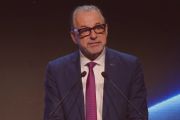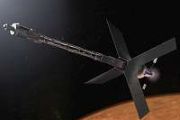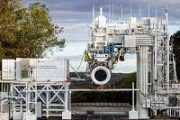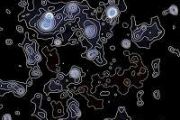
Copernical Team
Chinese rocket launches Mexican built satellites in international collaboration
 CAS Space successfully carried out the eighth flight of its Kinetica 1 rocket on Tuesday afternoon, sending seven satellites into orbit, including two designed and built in Mexico. The liftoff took place at 3:33 pm local time from the Jiuquan Satellite Launch Center in the Gobi Desert.
The payload package included a synthetic aperture radar satellite, an Earth observation satellite, and fi
CAS Space successfully carried out the eighth flight of its Kinetica 1 rocket on Tuesday afternoon, sending seven satellites into orbit, including two designed and built in Mexico. The liftoff took place at 3:33 pm local time from the Jiuquan Satellite Launch Center in the Gobi Desert.
The payload package included a synthetic aperture radar satellite, an Earth observation satellite, and fi Survey outlines advances and hurdles for orbital edge computing systems
 A team from the Space-based Intelligence Laboratory at the Innovation Academy for Microsatellites of the Chinese Academy of Sciences has published a detailed review of orbital edge computing (OEC), examining system design, applications, algorithms, and supporting tools. Their survey highlights current capabilities, major challenges, and future research directions for this rapidly advancing techn
A team from the Space-based Intelligence Laboratory at the Innovation Academy for Microsatellites of the Chinese Academy of Sciences has published a detailed review of orbital edge computing (OEC), examining system design, applications, algorithms, and supporting tools. Their survey highlights current capabilities, major challenges, and future research directions for this rapidly advancing techn SiriusXM activates SXM 10 to bolster North American audio network
 SiriusXM and Maxar Space Systems said the SXM-10 satellite has finished in-orbit testing and is now in full operational service with SiriusXM. The spacecraft launched on June 7, 2025 aboard a SpaceX Falcon 9 and advanced smoothly through checkout before handover.
"The SXM-10 satellite strengthens the health of our fleet and the infrastructure that provides a critical foundation for our aud
SiriusXM and Maxar Space Systems said the SXM-10 satellite has finished in-orbit testing and is now in full operational service with SiriusXM. The spacecraft launched on June 7, 2025 aboard a SpaceX Falcon 9 and advanced smoothly through checkout before handover.
"The SXM-10 satellite strengthens the health of our fleet and the infrastructure that provides a critical foundation for our aud IBM and NASA launch Surya AI model to forecast solar storms and safeguard technology
 IBM and NASA have introduced Surya, an open-source foundation model designed to interpret high resolution solar data and improve space weather forecasting. The system, trained on NASA's Solar Dynamics Observatory images, offers a new capability for predicting how solar activity impacts satellites, power grids, communications, and navigation systems.
The Sun, though 93 million miles away, h
IBM and NASA have introduced Surya, an open-source foundation model designed to interpret high resolution solar data and improve space weather forecasting. The system, trained on NASA's Solar Dynamics Observatory images, offers a new capability for predicting how solar activity impacts satellites, power grids, communications, and navigation systems.
The Sun, though 93 million miles away, h Gas streamers reveal how massive young stars gain their mass
 A research team led by Kyoto University and the University of Tokyo has identified gas streamers as a key mechanism feeding high-mass young stars, challenging the long-held assumption that large accretion disks are the primary drivers of stellar growth.
Massive stars, defined as those more than eight times the mass of our sun, form rapidly despite losing material through stellar winds and
A research team led by Kyoto University and the University of Tokyo has identified gas streamers as a key mechanism feeding high-mass young stars, challenging the long-held assumption that large accretion disks are the primary drivers of stellar growth.
Massive stars, defined as those more than eight times the mass of our sun, form rapidly despite losing material through stellar winds and Fireball lights up Japanese skies
 A flashing fireball dashed across the skies of western Japan, shocking residents and dazzling stargazers, though experts said it was a natural phenomenon and not an alien invasion.
Videos and photos emerged online of the extremely bright ball of light visible for hundreds of kilometres shortly after 11:00 pm (1400 GMT) local time on Tuesday.
"A white light I had never seen before cam
A flashing fireball dashed across the skies of western Japan, shocking residents and dazzling stargazers, though experts said it was a natural phenomenon and not an alien invasion.
Videos and photos emerged online of the extremely bright ball of light visible for hundreds of kilometres shortly after 11:00 pm (1400 GMT) local time on Tuesday.
"A white light I had never seen before cam What came before the Big Bang remains a mystery but new tools may help
 A team of physicists is arguing that one of the biggest taboos in cosmology-asking what existed before the big bang-can now be approached using numerical relativity. In a new paper published in Living Reviews in Relativity, Eugene Lim of King's College London, together with Katy Clough of Queen Mary University of London and Josu Aurrekoetxea of Oxford University, describe how computer simulation
A team of physicists is arguing that one of the biggest taboos in cosmology-asking what existed before the big bang-can now be approached using numerical relativity. In a new paper published in Living Reviews in Relativity, Eugene Lim of King's College London, together with Katy Clough of Queen Mary University of London and Josu Aurrekoetxea of Oxford University, describe how computer simulation Alien aurora: Researchers discover new plasma wave in Jupiter's aurora
 Researchers at the University of Minnesota Twin Cities have made a groundbreaking discovery by observing and analyzing the first new type of plasma wave in Jupiter's aurora. This research helps us understand "alien aurora" on other planets, which in turn teaches us more about how Earth's magnetic field protects us from the sun's harmful radiation.
The research is published in Physical Revi
Researchers at the University of Minnesota Twin Cities have made a groundbreaking discovery by observing and analyzing the first new type of plasma wave in Jupiter's aurora. This research helps us understand "alien aurora" on other planets, which in turn teaches us more about how Earth's magnetic field protects us from the sun's harmful radiation.
The research is published in Physical Revi Ceres once held deep energy reserves that may have supported life
 The dwarf planet is cold now, but new research paints a picture of Ceres hosting a deep, long-lived energy source that may have maintained habitable conditions in the past.
New NASA research has found that Ceres may have had a lasting source of chemical energy: the right types of molecules needed to fuel some microbial metabolisms. Although there is no evidence that microorganisms ever exi
The dwarf planet is cold now, but new research paints a picture of Ceres hosting a deep, long-lived energy source that may have maintained habitable conditions in the past.
New NASA research has found that Ceres may have had a lasting source of chemical energy: the right types of molecules needed to fuel some microbial metabolisms. Although there is no evidence that microorganisms ever exi LunaGrid Lite advances toward lunar power transmission milestone
 Astrobotic reported that its LunaGrid-Lite mission has cleared Critical Design Review (CDR) and has begun building flight hardware, moving the project closer to a planned 2026 demonstration of lunar surface power transmission. The mission will deploy 500 meters of lightweight cable across the Moon and deliver one kilowatt of power using an Astrobotic CubeRover.
"This milestone signals the
Astrobotic reported that its LunaGrid-Lite mission has cleared Critical Design Review (CDR) and has begun building flight hardware, moving the project closer to a planned 2026 demonstration of lunar surface power transmission. The mission will deploy 500 meters of lightweight cable across the Moon and deliver one kilowatt of power using an Astrobotic CubeRover.
"This milestone signals the 




























